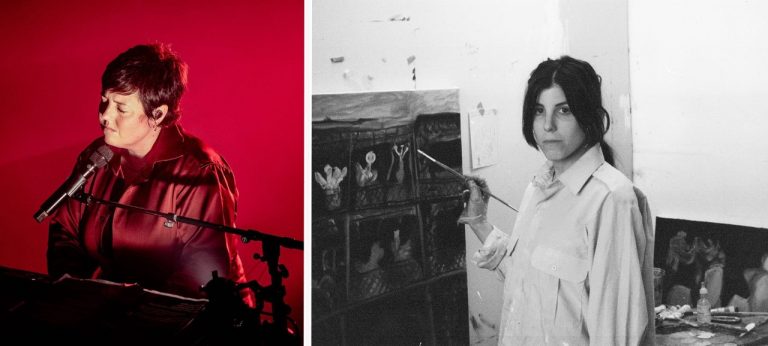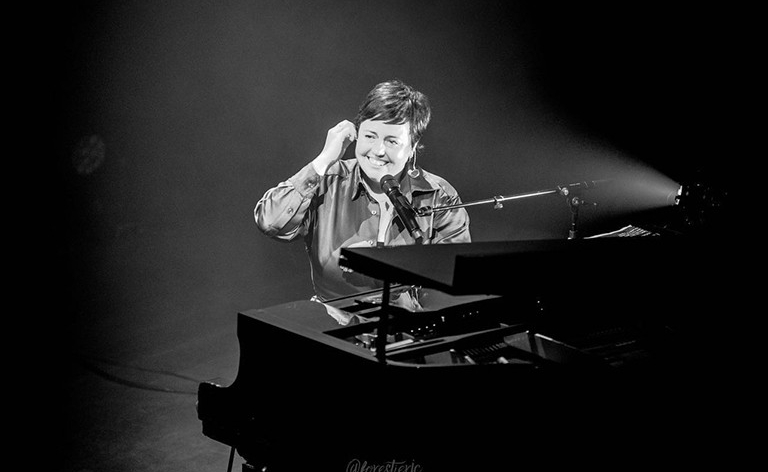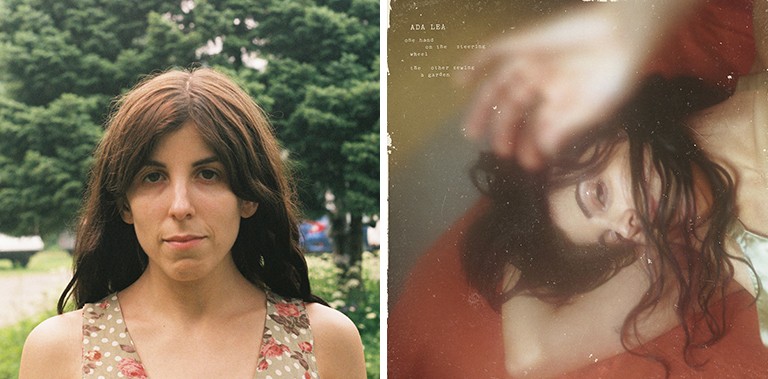Platinum-selling recording artist Ariane Moffatt and Polaris Prize-nominated Ada Lea share their songwriting expertise with Concordia music students

The Concordia Department of Music has two new instructors — and their names may be familiar.
Ariane Moffatt is a prominent figure in the Quebec music scene and Ada Lea, born Alexandra Levy, is a rising singer-songwriter. The two have joined the department this term to teach MUSI 263 – Songwriting I.
Moffatt is an award-winning Quebec artist whose first album was certified platinum in Canada. For her part, Levy’s album, one hand on the steering wheel the other sewing a garden, was nominated for the 2022 Polaris Music Prize, which celebrates Canadian recorded music.
The pair are teaching this term’s songwriting course. The course was designed to allow students to explore and develop their skills through regular songwriting as well as critical analysis of existing songs.
Levy will be the primary teacher while Moffatt will contribute to a quarter of the instruction.
“In our search for a songwriting teacher, Ariane Moffatt was the first person I thought of. Her exceptional, kind mentorship of our students during the shared CLOrk 22h22 performance at the MAC (Musée d’art contemporain de Montréal) in 2016 left a lasting impression,” says Eldad Tsabary, newly appointed associate dean of research and graduate studies and former Department of Music chair.
“More recently, I’ve had the delight of becoming acquainted with Alexandra. Her dedication to nurturing our students’ talents and her vibrant musical intellect was a very happy discovery,” he adds.
“I feel fortunate to collaborate with Ali and Ari. Their presence is a joyful and meaningful enhancement to our department’s culture.”
Both musicians say they are enthusiastic about their collaboration, which showcases the department’s contemporary and engaging approach to music education.
 Ariane Moffatt: "Songwriting is still therapeutic for me, and it remains the best way I know to connect with others."
Ariane Moffatt: "Songwriting is still therapeutic for me, and it remains the best way I know to connect with others."
Inspiration is everywhere, at all times
What aspects of your own songwriting processes do you plan to share with Concordia students?
Ariane Moffatt: Even after many years, a new song is still a gift from life. It is mysterious, and there is no specific path to finding a song that I can teach. It’s each person’s work to discover that.
Questlove, in his book The Creative Quest, encapsulates this idea well: “I’m not here to tell people what to do; I’m here to tell people what they can do.”
Ada Lea: I’m excited to share an aspect of my practice called “the songwriting method.” It’s a method my partner and I have been developing for the past few years with some friends. The premise is that you produce a song every three days, for one month, and repeat this process four times a year. By the end of the year, you’ll have 40 songs. It’s about just writing the song, no matter what stage of creation it’s at, no matter how “bad” or “good.” It gets people out of their heads and into the habit of creating with ease, support and play.
It’s been amazing to see how helpful this method is in unlocking people’s creative songwriting minds — we’re hoping to publish the concepts in some sort of book soon, to help more people along their journey.
How do you think songwriting can empower students to find their own unique voices?
AL: I think the path to empowerment is a slow and nurturing one, rooted in vulnerability. It’s about breaking from the image we think others have of us, or from the one we are desperately trying to project. In any creative act, the biggest barrier people face is often themselves, be it music, painting, drawing, photography, film, etcetera. Ariane and I aim to share specific songwriting techniques with students, but I believe empowerment comes from the simple act of “doing.” It’s found in exploration, curiosity, openness and the willingness to potentially embarrass yourself.
AM: Songwriting is still therapeutic for me, and it remains the best way I know to connect with others. I felt the most urgent need to address these aspects when I was my students’ age. So much was happening emotionally!
Songwriting serves as an incredible tool to channel and elevate all this intensity, bringing us closer to our true selves.
What insights do you hope to offer to aspiring singers or songwriters?
AM: As soon as we met, Alexandra and I realized we shared a common desire: to help students simplify and “de-dramatize” songwriting, instilling faith that it doesn’t have to be complicated or difficult. This involves developing a writing routine free from self-judgment, embracing creative flow instead of being blocked by intrusive or devaluing thoughts. Essentially, it means writing a lot, frequently, always looking ahead and not to the past.
 Ada Lea: “I think the path to empowerment is about breaking from the image we think others have of us.”
Ada Lea: “I think the path to empowerment is about breaking from the image we think others have of us.”
Reflecting on your own academic paths, what specific lessons or experiences do you think proved most valuable or influential in shaping your careers as singer-songwriters?
AM: Like many other disciplines, I would say, “Keep your eyes on the ball at all times.”
Having a total commitment toward what you want to achieve and developing a supportive community too can be very nourishing on this journey. Songwriting can be a solitary process. But in an academic context, working together becomes an advantage — an opportunity to bond, enrich your learning curve and break free from the confines of your own thoughts.
As singer-songwriters, where do you draw the most inspiration?
AM: Inspiration is everywhere, at all times. Translating it into a song depends on your ability to bridge daily observations with your sensibility, engaging your true self in a dialogue between the inner and outer worlds. It’s like a game, a process where you navigate life’s beauty and complexities — something I remain very curious and passionate about.
Ada Lea, you mentioned that you are inspired by Montreal. How does the city influence your songwriting, and how will you bring this sense of place into your teaching at Concordia?
AL: Montreal’s charm is through the roof. It’s an easy place to fall for. I personally love songs with a strong sense of place, so naturally that’s what I sometimes go for in my own songwriting.
Some of the constraints for the students this semester will be location-based. But I think, more than location, students will quickly see what works and doesn’t work for them. As I always say, “If it worked for Leonard Cohen, then it can work for you, too.” Just kidding — I’ve never said that before.
The more specific you are as a storyteller, the more the listener will feel respected and trust you. And the more willing they’ll be to bring their own experiences and emotions to the table.
What aspects of your teaching do you think students will enjoy or resonate with the most, or find the most inspiring for their creative journeys?
AM: My hope is that students will sense that, for me, being an artist is intricately tied to my profound attachment to and curiosity about all human beings. My wish is also that they trust in my ability to see them for who they are, without judgment, and believe that I will humbly assist them on their creative journeys.
Find out more about Concordia’s Department of Music.


